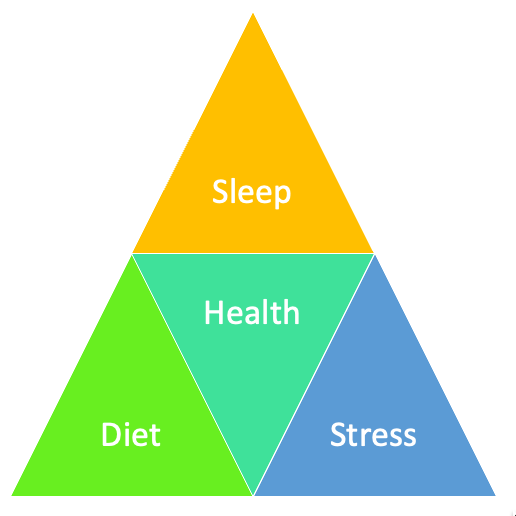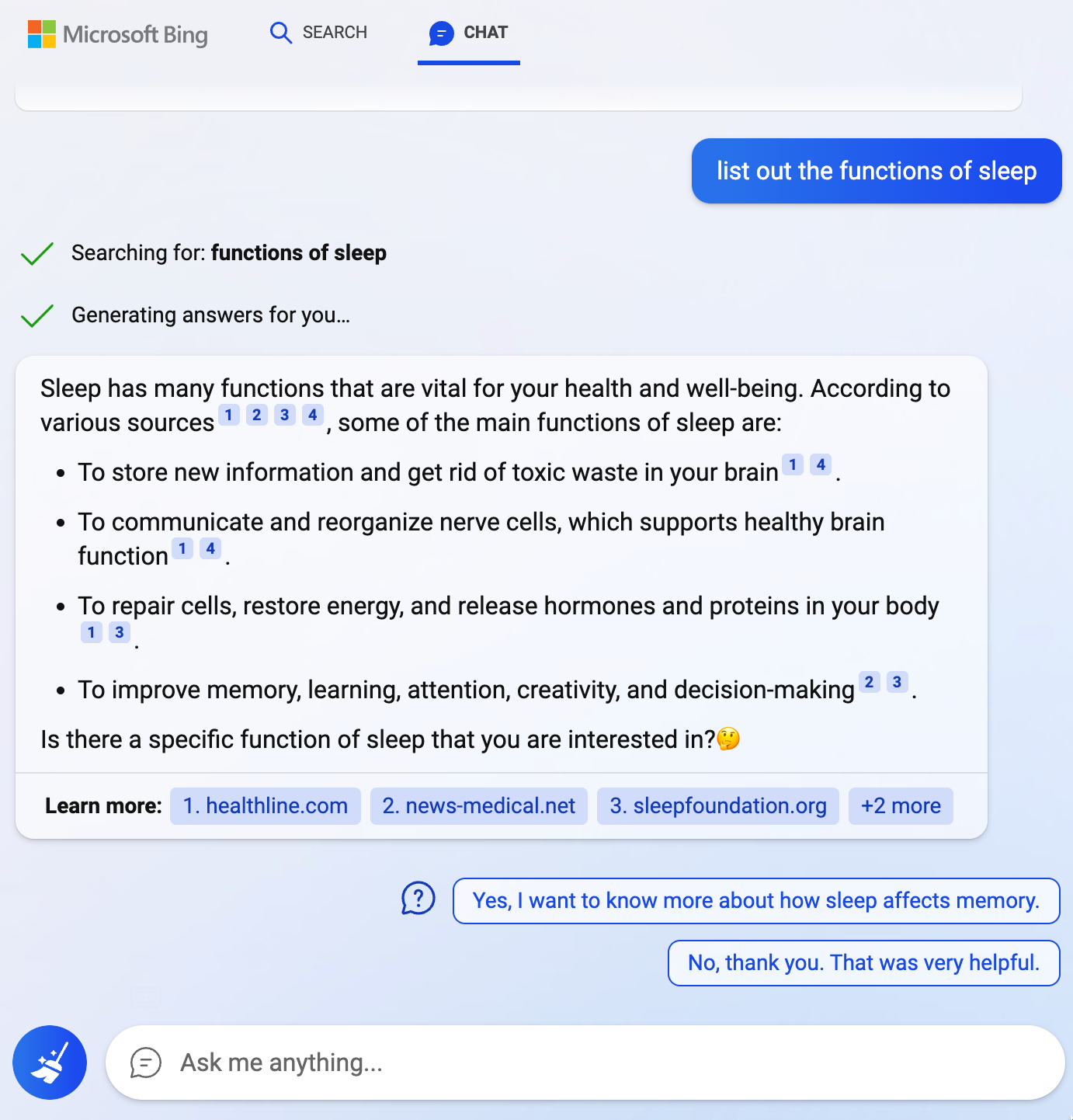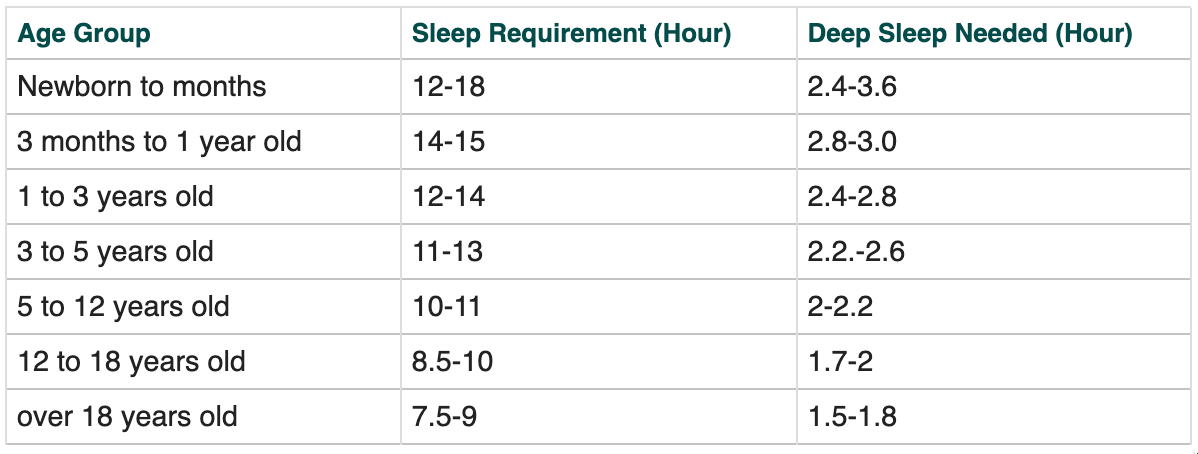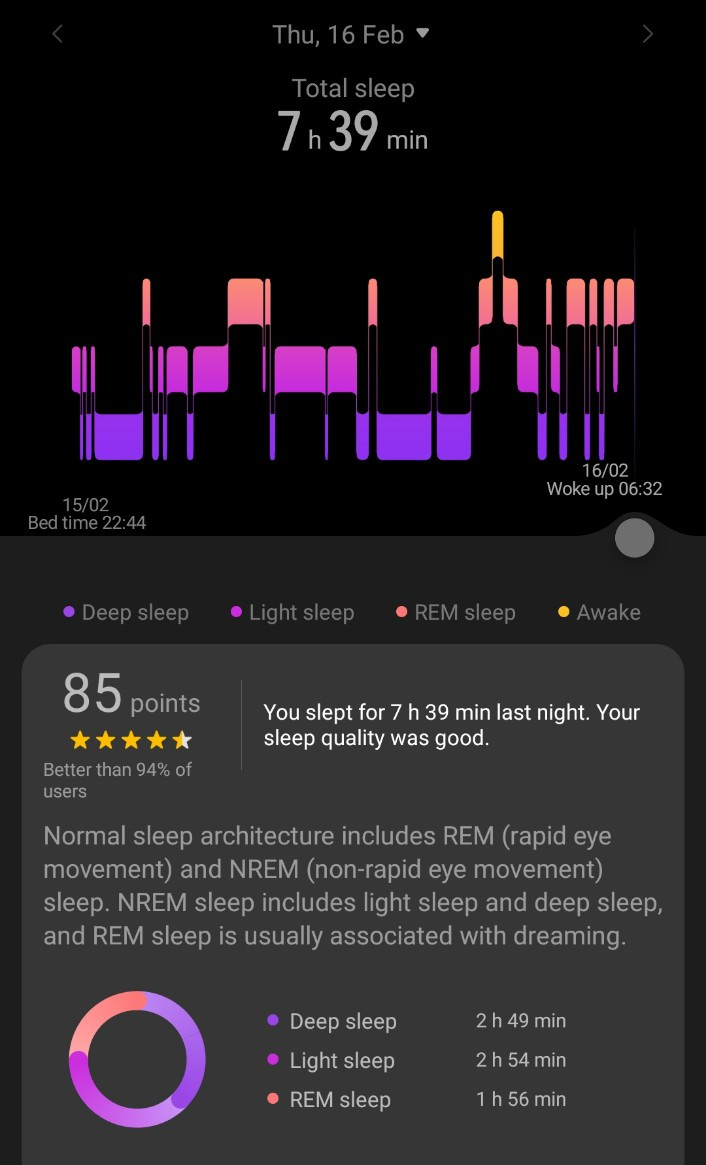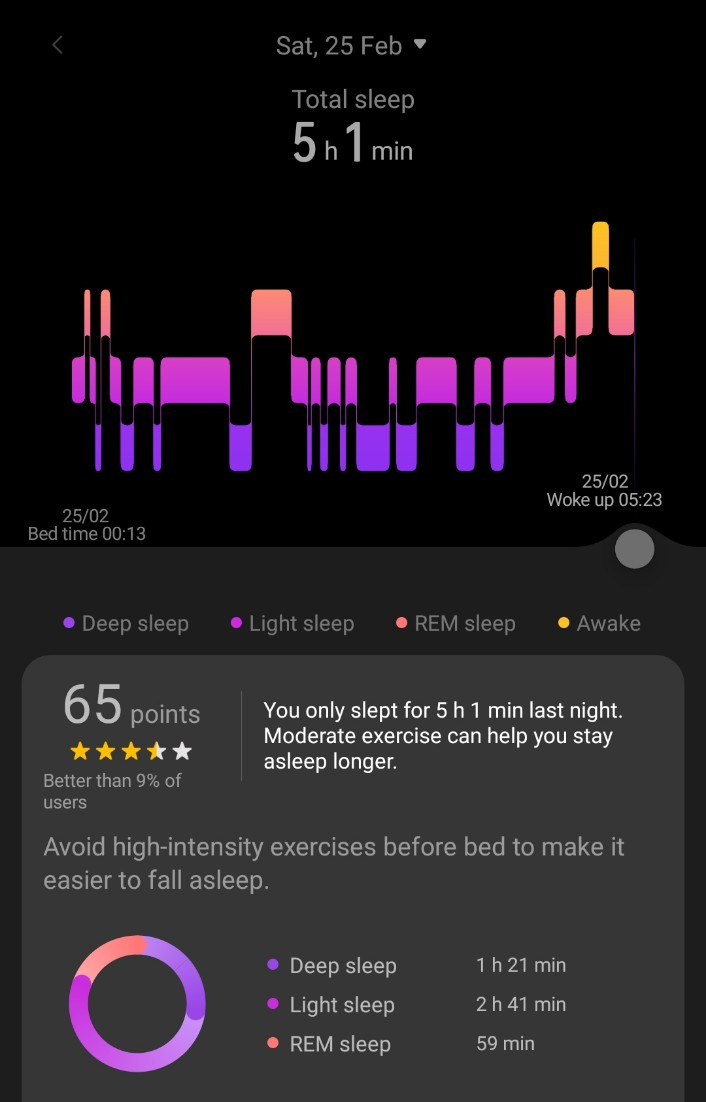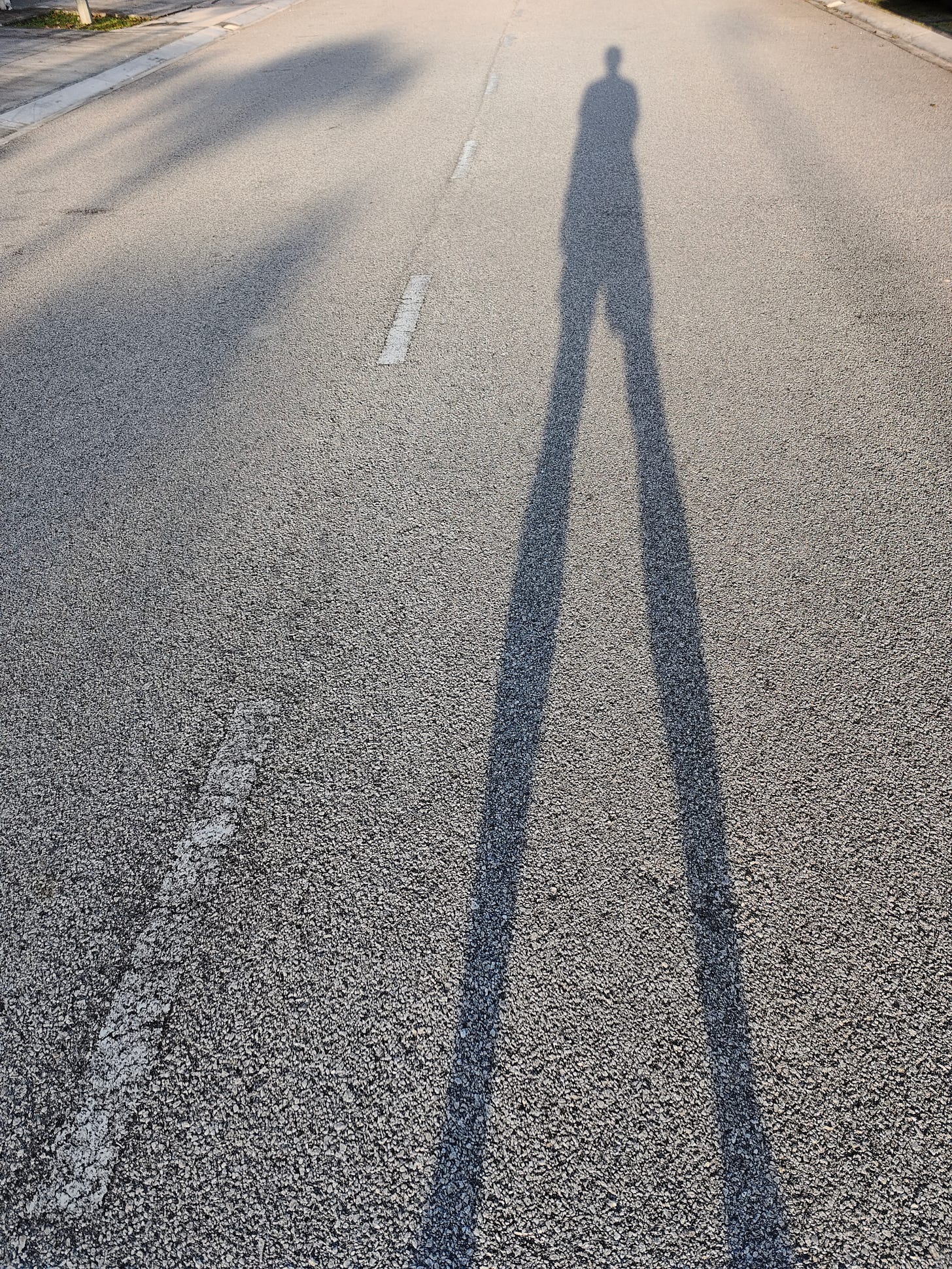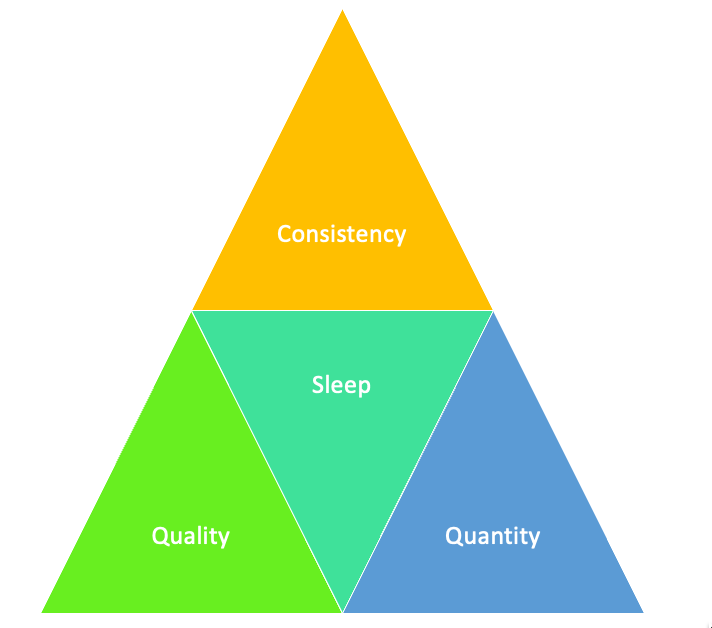Myth
I used to be proud of my ability to sleep 4 hours a day or 4 hours over 72 hours. I thought the ability to have short sleep represented high productivity and was equivalent to strength.
“You can sleep when you die.”
I was wrong, dead wrong.
Tetrahedron of Health
We can imagine a table with 3 legs or Vann Diagram with 3 overlapping circles. I like the tetrahedron, which is a 3-D 4-equal triangle. You can see this 2-D illustration that I used frequently in OLO. This method forces me to narrow down many factors to the essential 3 elements for easy focus.
You may be wondering, how about ‘exercise’? Exercise is a form of eustress (good stress), similar to hot therapy (sauna) and cold therapy (cold shower). If you are keen to explore more, you can read my journal about stress management.
Out of the 3 core pillars of health maintenance, having a quality good sleep gives the highest return on investment (ROI of our time and money):
quality food and exercise gear or gym memberships are high-cost
if you do not enjoy preparing healthy meals or exercising, you treat the time spent as a waste, but everyone sleeps daily. We have to optimize the quality of the sleep
Since the COVID pandemic, I have shifted my beliefs and mindset 180 degrees regarding sleep. Now, I prioritize good sleep over any form of self-care treatment. Based on my current understanding (I could be wrong, and I am continuing to learn), these were my ‘sins’ and ‘mistakes’ with my old sleep habits:
no fixed sleeping pattern
no ritual preparing for my sleep
prioritize getting work done (or studying) up to midnight or not sleeping at all overnight (especially rushing for tender proposal)
finishing the finale of an exciting drama series past midnight
consuming media like YouTube before sleep
lack of understanding of how diet and timing to eat affect sleep
What Sleep Does for Wellbeing?
I am not an expert in sleep; I am just curious to learn. You can readily find some of the latest scientific findings about sleep, but be aware that new findings may overturn previous understanding.
We do not need a sleep scientist to tell us the importance of sleep. We can feel it after a single night of lousy sleep. If we self-reflect, some of our chronic health problems are highly related to our bad sleep habits. Some studies suggest that one night of poor sleep has a similar effect to pre-diabetes, and two weeks of poor sleep is similar to diabetes.
From a productivity standpoint, sleep seems to be a total waste of time and vulnerability, as we are not awake to defend ourselves from potential danger. However, evolution still keeps organisms having sleep time; there must be some special purpose.
Let me ask ChatGPT using Bing search, hah hah:
It will be an interesting experiment to ask ChatGPT to write this Bear Path journal for me.
Here are the core functions of sleep that I believe:
to organize what we experience (information data) during the day. Purge less important info and associate important lessons with existing memory (especially info that aids survival). A crude analogy is like we organize the computer's hard disk.
shut down most of our bodily functions, allowing our organs to enter into a maintenance mood. An analogy is shopping malls close at 10 pm, allowing cleaning service, maintenance, and new renovation to be carried out at night and re-open for business at 10 am on the next day. This is where most detox action and growth happens (not during our awake time).
The brain takes advantage of our body being in ‘disabled’ mode, which is a safe environment to run ‘training simulations’. An analogy is a computer simulation game with virtual reality, where we have weird dreams. The simulation prepares us to practice and dry-run different scenarios and experience other scenarios. Dreams have other functions and complications, which will be another interesting journal entry.
What happens if I deprive myself of good sleep?
I have made vital mistakes in the past when I was ignorant about the importance of quality sleep. I wish my colleagues and friends could avoid similar mistakes.
Poor cognitive (mental) capacity, lack of clarity, and poor memory. This is like a computer hard disk running slower and slower without good formatting maintenance. I made this mistake while studying and working: staying up too late, waking up too early, and being sleep-deprived.
We need more sleep when we are young. [source: How much deep sleep do you need?]
Hence the current schooling system is a problem, it should start at 9 am instead of 7 am. During high school, I woke up at 5 am (prepare my own breakfast), took the bus at 6am+, and commuted for an hour + to another town to start school at 7 am+. We have to study every subject in 3 languages, and with active extracurriculars, it is common for me to reach home in the evening, like 6 pm or 8 pm, finish homework, and sleep by 1 am. I continue 4-5 hours of sleep even when I am 40+, until recently when I switch to 7-8 hours of sleep.
If I have an exam to take tomorrow, I will ensure that I have had very good sleep for the entire week or month and that I have done aerobic exercise the morning before the exam, which can improve my cognitive capacity.
Poor health (organs that are not maintained at optimum condition, low immunity, poor signaling with disrupted hormones and neurotransmitters)
The danger of health problems caused by poor sleep is chronic gradual degradation (the silent killer). The lack of systems thinking and functional medicinal knowledge blinds us to the delicate (complex) nature of our health and well-being.
Poor sleep is shown by many experiments that have a direct causal relationship with many health problems such as obesity, illness due to low immunity, poor cardiovascular, diabetes etc.
Lousy mood and slow alertness
If we are mindful, we can sense how a night of poor sleep can swing our mood and alertness the next day. Personally, I tend to be easily irritated and sluggish (slower reaction time, less observant).
An analogy is like broadband versus slow Internet access bandwidth. If I have a good sleep, it is like streaming 4K YouTube in high definition, versus the 480p low-resolution video (lacks clarity, jerky)
Besides safety issues like road accidents, a poor mental state could also lead to family and work relationship tensions. An interesting study showed that daylight saving hours in the United States correlate to car accidents, divorce, and harsher court judgments (due to the one-hour less sleep).
Gadget or Self Assessment?
I have pretty poor sleep quality this week, likely due to stress.
21 Feb 2023: I hardly sleep, only light sleep, staying awake until 4 a.m. due to my bloated tummy. The air in my intestines pressed the organs and diaphragm and caused discomfort.
I use the Huawei Health App with my Huawei Smart Watch to monitor my sleep. I know the measurements are not 100% reliable, but some of the data could be convenient to keep the average record for a long duration, such as the total duration of sleep and the number of times waking up. Using ‘feeling refresh’ as a self-check, the biological feeling and the measurements do not tally so far. The watch measured 99% great sleep, but I did not feel I was on top of the world.
The app rates the quality of sleep using 100 points and compares it with that of other users of the same app. Sometimes, I get 5%, and on a good day, I get 99% (better than other users). Below are the sleep reports from my Huawei Health App on 16 Feb vs. 25 Feb.
I doubt the accuracy, but some trends and markers are useful information.
(1) I can pay attention to the duration of Deep Sleep and REM Sleep. My target is to get about 2 hours of each type of sleep
(2) Improve deep sleep continuity. If you see that the purple color deep sleep on 25 Feb was more ‘fragmented’
(3) Reduce the number of times I wake up during the night. One time is normal. If I can quickly fall back to sleep, one time waking up to pee is fine and normal (ideally, zero time). It is common for us to wake up one to two times when we age.
Why are your sleeping rituals or tips for better quality sleep? Do share in the comment section. I am keen to learn from my friends.
Stop-Start-Keep (SSK) Doing
Stop Doing
digital screen an hour before sleep (TV, tablet, phone)
drinking water or tea too near to the bed time
avoid coffee after lunch time due to the half life of caffeine is 6 hours. So it takes 12 hours for the caffeine effect to go away. Coffee as a diureutic, causing kidney not absorbing as much water, that increases the need to pee during the night
Start Doing
try out Oura Ring, I prefer one-off payment instead of the subscription.
drinking Chamomile tea before sleep. I suspect Chamomile tea actually reduces my REM sleep (still a hypothesis to be verified).
new spreadsheet to track every food ingredient and try to find out potential ‘trouble makers’ that cause tummy bloating. The complexity is up to the portion and amount, timing, and combination of food. Meaning that I suspect that when I overeat certain fibers with the presence of other fibers (e.g. asparagus, plus dried apricot, or too many nuts), or some unknown sugar alcohol, or plus stress. Meaning the same ingredient will be fine if I eat it alone in moderate portions, during lunchtime. Hence the complexity is high. Another variable is that my microbiome may be changing too.
look for a practical electronic chilling pad that can lower my body temperature. Ideal room temperature is around 20 Celcius (about 68 Feranheit)
source for red light bulbs (turn my bedroom into a red light district). Currently I am using low voltage LED variable dimming lights, mostly yellow light spectrum.
resume evening meditation that could help to falling back to sleep if waking up in the middle of the night.
monitor is I have mouth breathing problem (I tried once using the mouth tape). I suspect I may pause breathing during sleep.
placing the mobile phone further away from the bed, or getting an electro-magnetic (EM) wave detector to measure other electronic devices in the vicinity
Keep Doing
finish dinner 3-4 hours before bed, indigestion disrupts sleep. Good fasted state throughout the sleep promote autophagy
tapper down water intake a few hours before sleep to reduce the urge to wake up at night
keeping the temperature low with air-conditioning
close the black-out curtain
switch to dim yellow light
expose to the morning sunlight into my eyes and skin, to tune my circadian rhythm (internal body clock). The morning lights stimulate production of serotonin (血清素) in the morning, which is converted as melatonin (褪黑素) at night.
exercise in the morning is better than exercising at night which may raise the cortisol level
monitor my sleep with a lightweight gadget (smartwatch)
avoid nap, and keep napping time to 15 minutes, or maximum 30 minutes
assess my sleep quality with inner feeling (how I feel after the rest) vs the measurements (they do not tally on most days)
maintaining 10pm-6am sleep pattern. I wake up around 5am+ most of the time
build the resiliency to withstand disruption once in a while (I watched the Worldcup final football match at 3 am. It was okay, once in 4 years)
continue to sleep without setting alarm clock for normal days, following my body clock
separate bed room and bed as the resting environment, avoid doing work in the bed room or reading on the bed
Have fish oil, tart cherry, and sometimes magnesium supplements after dinner. Banana may be good too.
continue to get 7-8 hours sleep every night, and 2 hours of deep sleep and 2 hours of REM sleep. The Huawei Health App monitor my average sleep duration for the last year, monthly average is within the 7-8 hr duration, but not meeting my goals for better sleep quality.
Since the pandemic, I changed by sleep pattern and duration. Now I am a devotee of 7-8 hours sleep (everyone is diffferent, adult > 18 years old typically is 6 to 9 hours), I am no longer proud of being who can withstand 4 hours sleep for decade, I was a fool.
I shall continue to practice sleep hygiene consistently, and learning ways to improve the sleep quality and quantity.
Weekly Updates
21 Feb: my wife's still having blood in her urine since 13 Feb, so the doctors agreed to remove the urinary tract stents today instead of leaving them inside her body for 6 weeks. Left home at 7 am and reached home before 9 pm. The traffic did not seem to lessen with the school holiday, perhaps the parents have already taken their leave from work during the recent Chinese New Year and Thaipusam.
22 Feb: Brought my MiL to visit the haematologist and palliative care doctor. Her fasted blood test shows a stable condition, with low lymphocytes. Now we have to deal with her psoriasis that is returning. So my focus for the remaining week is to go deep dive into psoriasis if any suitable diet and cream for topical relief. Weak immunity (due to the chemo drugs) could be one of the triggers.
She has taken in some inflaming foods recently from the relative visits and takeaway foods: pizza, fried chicken wings, cream puff, sweet pastry, high sugar fruits like grapes, cherry, mango, carbohydrates like rice, quinoa, pumpkin noodles etc. Need to cut down on processed food, fried food with seed oils that are high in omega 6, carbohydrates and sugars, dairy products like cream, toxins from nightshades, high lectin, and high gluten food. She does not smoke or drink alcohol, those are bad for Psoriasis too. She should grow new skin in 8 to 12 weeks (for her age).
25 Feb: Accompanied my wife to visit the doctor, 2 weeks after her surgery. She is expected to recover after 4 more weeks. So far she is recovering well.
I still enjoy watching movies and dramas to destress. I am on my treadmill after dinner and consume the entertainment on a TV screen. I am on “The Glory” and “The Last of Us” this week, plus a few other live shows and movies.
The Glory [TL: interesting but a still following unsurprising Korean drama story line and roles. 6 / 10]
The Last of Us [TL: I enjoy this series. It put more weights to portrait the inner emotions and vulnerability of the characters, instead of mindless zombie killing, blood shed or cheap scares. 8 / 10]
Sharper [TL: wrestling of con artists which is engaging, the climax is the middle part when the audience is exposed to a bigger scheme, but the ending is a bit anti-climax because most of us could guess the final act will be the revenge. I still enjoy the layers con-and-dump plot. 7 /10]
Chronique d’une liaison passagere (Diary of a Fleeing Affair) [TL: interesting narrative style, very European (non-Hollywood) way to story tellling. Surprising I manage to finish the entire movie despite it is unstopped dialogue, very engaging, no nudity despite the title, hah hah. 6 / 10]
搬山道人之落天荒 [TL: I could not stop laughing of the ambition of the production but fail to deliver an Indiana Jones style of adventure movie. 3 / 10]
I listen to podcasts while commuting and play YouTube when I cook for lunch and dinner. Perhaps I will leave this topic to another journal about how I consume movies and media.


